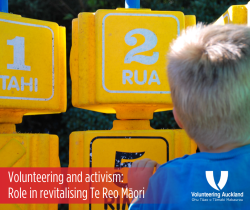Volunteering and Activism: Role in Revitalising Te Reo Māori

Te Reo Māori, an official language of Aotearoa New Zealand, is a vital part of Māori culture and identity. For decades, Te Reo Māori faced decline due to colonisation, language suppression policies, and the dominance of English. However, in recent years, there has been a significant resurgence of efforts to revitalise Te Reo Māori.
A crucial driving force behind this revival has been the dedicated work of volunteers and activists who have tirelessly championed the language's importance and ensured its survival for future generations. This article explores the role of volunteering and activism in the revitalisation of Te Reo Māori and the broader impact on Māori culture.
The Historical Decline of Te Reo Māori
The decline of Te Reo Māori can be traced back to the effects of colonisation in the 19th and 20th centuries. The imposition of English as the dominant language, along with policies that discouraged or even punished the use of Te Reo Māori in schools, led to a dramatic reduction in the number of native speakers. By the 1970s, Te Reo Māori was at risk of extinction, with only a small percentage of Māori children being fluent in the language.
The decline of Te Reo Māori had profound implications for Māori culture. Language is a core component of cultural identity, and the loss of language was seen as a loss of cultural knowledge, traditions, and values. The erosion of Te Reo Māori threatened the transmission of Māori customs, oral histories, and spiritual beliefs, which are deeply intertwined with the language.
The Emergence of Activism for Te Reo Māori
The revitalisation of Te Reo Māori gained momentum in the 1970s, spurred by a broader Māori cultural renaissance and activism for indigenous rights. Māori activists, often operating as volunteers, played a pivotal role in raising awareness about the importance of Te Reo Māori and advocating for its preservation.
The Māori Language Petition of 1972, which gathered over 30,000 signatures, was a landmark moment in the language revitalisation movement. Presented to the New Zealand Parliament, the petition called for Te Reo Māori to be officially recognised and taught in schools. This activism led to significant milestones, including the establishment of Te Reo Māori as an official language of New Zealand in 1987 and the creation of Māori-language broadcasting.
Volunteers and activists have also been instrumental in the development of Kōhanga Reo (Māori language preschools) and Kura Kaupapa Māori (Māori-language immersion schools). These initiatives have been critical in creating environments where Māori children can learn and speak Te Reo Māori from a young age, ensuring the language's transmission to future generations.
The Role of Volunteers in Language Revitalisation
Volunteers have been at the forefront of efforts to revitalise Te Reo Māori, dedicating their time, energy, and passion to various initiatives. These volunteers come from diverse backgrounds, including Māori elders, teachers, community leaders, and language enthusiasts, all united by a common goal: to ensure the survival and flourishing of Te Reo Māori.
-
Language Classes and Workshops: One of the primary ways volunteers contribute to language revitalisation is by teaching Te Reo Māori. Community-led language classes and workshops, often run by volunteers, provide accessible opportunities for people to learn and practice Te Reo Māori. These classes cater to different skill levels, from beginners to fluent speakers, and play a crucial role in building language proficiency and confidence.
-
Mentoring and Language Nest Programmes: Volunteers also participate in mentoring programmes and language nests, where fluent speakers are paired with learners to provide one-on-one support and guidance. These programmes help learners develop their language skills in a supportive and immersive environment, fostering intergenerational language transmission.
-
Resource Development: Volunteers contribute to the creation of educational resources, including textbooks, online courses, apps, and language games. These resources make learning Te Reo Māori more engaging and accessible, catering to different learning styles and preferences.
-
Cultural Events and Festivals: Volunteers organise and participate in cultural events and festivals that celebrate Te Reo Māori and Māori culture. These events, such as Māori Language Week (Te Wiki o Te Reo Māori), provide platforms for people to use and experience Te Reo Māori in everyday contexts, raising awareness and appreciation of the language.
The Impact on Māori Culture
The revitalisation of Te Reo Māori through volunteering and activism has had a profound impact on Māori culture. Language is not just a means of communication; it is a carrier of cultural knowledge, values, and identity. By revitalising Te Reo Māori, volunteers and activists are helping to strengthen and preserve Māori culture.
-
Cultural Identity and Pride: The resurgence of Te Reo Māori has led to a renewed sense of cultural identity and pride among Māori people. Speaking and hearing Te Reo Māori reinforces connections to ancestry, land, and traditions, fostering a deeper understanding of what it means to be Māori. This cultural pride extends to younger generations, who are growing up with a strong sense of their heritage and cultural identity.
-
Intergenerational Knowledge Transfer: The revitalisation of Te Reo Māori supports the transmission of traditional knowledge, stories, and customs. Elders and fluent speakers can share their wisdom and experiences with younger generations, ensuring that cultural practices and values are preserved and passed down.
-
Social Cohesion and Community Empowerment: The efforts to revitalise Te Reo Māori have brought communities together, fostering social cohesion and collective action. Language revitalisation initiatives create spaces for collaboration, learning, and cultural exchange, empowering communities to take ownership of their language and cultural heritage.
Challenges and the Path Forward
While significant progress has been made in revitalising Te Reo Māori, challenges remain. The number of fluent speakers is still limited, and there is a need for more resources, funding, and support to sustain language revitalisation efforts. Additionally, the integration of Te Reo Māori into mainstream education, media, and public life requires ongoing advocacy and commitment.
The future of Te Reo Māori depends on the continued dedication of volunteers and activists, as well as the support of wider society. By embracing the language and recognising its value, Aotearoa New Zealand can honour its bicultural heritage and ensure that Te Reo Māori thrives as a living, vibrant language.
Conclusion: A Collective Effort for a Shared Future
The revitalisation of Te Reo Māori is a testament to the power of volunteering and activism in driving social and cultural change. Through the tireless efforts of volunteers, activists, and communities, Te Reo Māori is being revitalised, enriching the cultural landscape of Aotearoa and strengthening the identity and resilience of the Māori people. As Aotearoa New Zealand continues to navigate its bicultural journey, the role of Te Reo Māori and the volunteers who champion it will remain crucial in building a future that honours and celebrates the language, culture, and identity of the Māori people.

